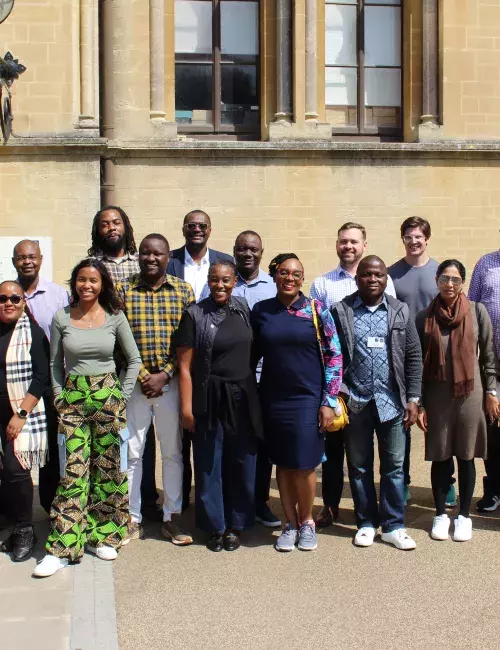Customised Executive Education
In brief
Contact our executive education team to learn more about a partnership:
Overview
Sustainability and the environment for business, NGOs, the public sector and government
At Oxford Smith School, we are firm believers in the University of Oxford’s aim to lead the world in research and education, in ways which benefit society on a national and a global scale. We help to achieve this aim through providing executive education at the connection between enterprise and the environment.
We design our bespoke executive education programmes to equip leaders from business, NGOs, the public sector and government with the skills to transform their organisation’s approach to sustainability. Each course is thoughtfully constructed to respond to the particular challenges your organisation faces.
Customisation options
We offer different approaches to customisation, tailoring our existing courses to various levels or developing an entirely bespoke course. Our executive education team will work with you to assess your learner profile and develop a course to best suit your needs and goals. It is possible to mix-and-match approaches, for example to modify some modules and add entirely bespoke modules to the same offering.
We tailor our courses to suit a wide variety of expertise profiles, from beginners to experts. Our offerings span the full suite of delivery formats across online, hybrid, in-person at Oxford, or at external sites. Contact our team for an initial discussion of your needs, learners, goals, and delivery preferences, and a no obligations quote.
Working in collaboration with Accenture’s dedicated learning team, Oxford Smith School developed a sustainability online lecture series in 2021 with introductory sessions across key sustainability themes including the circular economy, cooling and net zero. In 2022 Accenture and Oxford Smith School co-designed and delivered a subsequent series focused around six sustainability challenges faced by executives including sustainable leadership and net zero transitions. Four of these webinars were developed into a mini-series for Accenture’s Asia Pacific region including Indonesia, Malaysia and China. Over 3,000 Accenture employees attended series 2 sessions alone.
Bespoke modules
The Oxford Smith School offers a wide range of topics for either modifying an open course or designing an entirely bespoke learning programme. All our open courses are available for modification. This non-exhaustive list provides an overview of customisation modules that could be integrated into existing courses or combined to form a bespoke programme.
We are able to draw on our network of partners across the university to help deliver modules suited to your needs, including the Saïd Business School, Environmental Change Institute, Transport Studies Unit and Institute of New Economic Thinking (INET) among others. Please contact our team to discuss your needs and interests, and we will be delighted to provide you with a proposal suited to your context.
"The programme gave us worthwhile insights into some of the key factors in the energy transition and climate debate which we have been using in our investment process assessments. The demographics session has also sparked interest in the topic at the Fund and we have done further deep research and thinking in the topic, our investment strategy and as it relates to the broader global macro environment and outlook.
From an organisational perspective, the Smith School has been very professional, responsive and accommodating with regards to issues and concerns we may have had. The course director and the team were delightful to work and engage with. The venue was great as was the catering."
Business Model Innovation for Sustainability
Examine opportunities for companies in different industries to embrace innovation in business models as a way of supporting sustainable development and net zero.
Corporate Strategies to Decarbonise
Turn random acts of greenness into a metrics driven strategy. Introducing strategies, practices and tools available that can improve carbon footprints and increase competitive advantage.
The science of climate change and its impacts
Emissions and the climate response, the difference between weather and climate and attributing climate change to extreme weather events.
Spatial data, earth observation, and machine learning
Emerging datasets and methods for localising environmental risks and impacts
ESG in a Diverse World
How to drive inclusive organisations ESG/DEI, what does sustainable value creation look like at board level, and what should the board focus on in these areas.
ESG Measurement and Metrics
Moving from an overview of the current ESG landscape to reporting practices, investing activism and challenging the metrics themselves.
Sustainable Finance & the financial metrics of sustainability
Emerging trends in sustainable finance in the UK and globally and the implications for financial and non-financial metrics. Lifting the hood on sustainability metrics - the good, the bad and the ugly. Deep dive on climate and nature-related metrics - assessing risk, impact and alignment.
Stranded assets and transition risks
Managing climate related risks and the resilience to transition to net zero. The current trends in finance affecting businesses and investments.
Leadership: Corporate governance and sustainability
Governance through boards and executive compensation and how these fit within the sustainability of organisations, with views on short-termism, current practice, & regulation.
Law: How law shapes the net zero transition
Shaping the transition through legislation, litigation and innovative contracting including the effects of financial and scientific advances.
Net Zero: The Economics of Net Zero
Exploring the interplay of policy, markets, behaviour and technology to enact possible systemic solutions through the lens of economics.
Net Zero: Getting Net Zero Right: Standards and Policy
An update on the corporate and governance response to net zero, including the governance landscape, latest policies, standards and considerations for offsetting.
Nature-based solutions (NbS)
Biodiversity and its relationship with global change and how business can achieve a nature-positive economy.
Technologies for sustainability and net zero
From carbon capture and storage to the application of machine learning for global surveys and spatial finance and block chain for supply chain provenance.
Approaches to greenhouse gas removal
Consider greenhouse gas removal techniques including technologies for carbon removal.
Executive Education leads
In brief
Contact our executive education team to learn more about a partnership:





